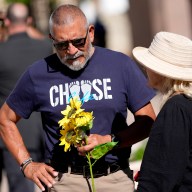YANGON, Myanmar – Myanmar’s military government said Thursday that its trial of Aung San Suu Kyi would have no political impact, though many have criticized the proceedings as a ploy to sideline the pro-democracy leader during elections scheduled for 2010.
The highly popular Suu Kyi, whom the regime has sought to remove from the political arena through years of detention, is on trial for violating the terms of her house arrest after an American man swam to and sneaked into her lakeside home.
A Foreign Ministry statement, carried in state-owned newspapers, said the trial was strictly related to the rule of law and “will not have any political impact.”
“The government, therefore, will hold multiparty general elections, fifth step of the Road Map, in 2010,” the statement said, referring to the junta’s “road map to democracy,” which critics say will merely extend the military’s decades-long rule under the guise of democracy.
The only witness the defense was allowed to call – the court rejected the others – appeared Thursday. The trial was then adjourned until Monday when closing arguments will be heard.
As the trial proceeded inside Yangon’s Insein prison, an unidentified man was arrested nearby after he shouted for Suu Kyi’s release and unveiled a poster with her photograph, according to eyewitnesses. No other details were immediately available.
If convicted, the 63-year-old Suu Kyi could be sentenced to five years in prison. Myanmar’s courts operate under the influence of the military and usually deal harshly with political dissidents.
John W. Yettaw, the American whose uninvited visit to Suu Kyi’s home triggered the case against her, testified Wednesday that he was “sent by God” to make his nighttime swim to her compound earlier this month, according to Nyan Win.
The regime’s critics charge that the case against the Nobel Peace laureate – who has been in detention without trial for more than 13 of the past 19 years – was concocted to keep her detained during elections the government has planned for next year. She pleaded not guilty Friday.
Suu Kyi’s defense lawyers argue that her harboring Yettaw did not constitute a violation of her house arrest and that it was the duty of government guards outside her property to prevent any intrusions.
Appearing as defense witness Thursday was Kyi Win, a member of Suu Kyi’s National League for Democracy party who was briefly arrested after the bloody 1988 pro-democracy uprising and two years later won a parliamentary seat in elections the regime has never recognized.
Nyan Win, one of Suu Kyi’s lawyers, said that rejected defense witnesses were another lawyer and two senior members of Suu Kyi’s party.
The court said legal procedure allows it to reject witnesses who are proposed “for the purpose of vexation or delay or for defeating the ends of justice.”
Nyan Win told reporters it was unfair and inappropriate to reject witnesses in such an important case. He said the court had approved 23 prosecution witnesses, of whom 14 took the stand.
Two female party members who live with Suu Kyi, and the 53-year-old Yettaw, face the same charge as Suu Kyi and have also pleaded not guilty.
During three hours of prosecution questioning on Wednesday, Yettaw, of Falcon, Missouri, spoke repeatedly of his plan to warn Suu Kyi of his premonition that she would be killed, said Nyan Win, who added that he said he had been sent by God.
Yettaw, who also secretly visited the house late last year without meeting Suu Kyi, said he visited because “in his vision, Daw Aung San Suu Kyi would be assassinated by terrorists and the terrorists would put the blame on the government. So he came to warn both the government and Daw Aung San Suu Kyi,” according to Nyan Win. “Daw” is a term of respect used for older women.
Many of Suu Kyi’s supporters have criticized Yettaw as a fool or dupe for getting her into trouble.
Nyan Win said the defense had nothing to ask the man.
Suu Kyi acknowledges that she allowed him to stay for two days after he swam across a lake to enter her house and then said he was too tired and ill to leave immediately.
In a statement submitted to the court Tuesday, Suu Kyi said she intended to report the visit through her doctor, Tin Myo Win, one of the few outside people allowed to see her. But after the intrusion, Tin Myo Win was not allowed into her house and was later held by authorities for more than a week. He has not appeared at the trial.
Yettaw testified that security personnel observed him during both his visits to Suu Kyi’s house, said Nyan Win. But in neither case did they try to stop him.
The trial has sparked intense criticism worldwide of Myanmar’s military regime, even among the country’s Asian neighbours that normally refrain from commenting on its internal affairs.
Myanmar has been under military rule since 1962, even though Suu Kyi’s party won the 1990 general election.













